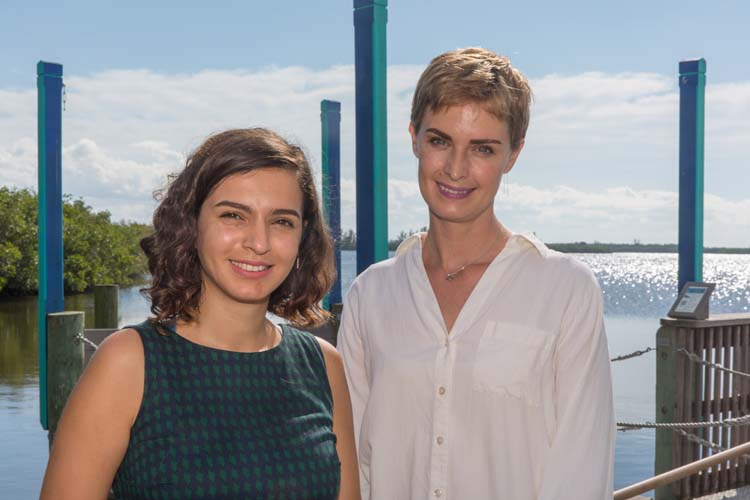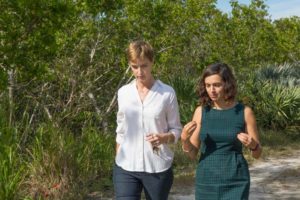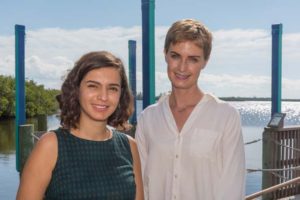
Molly Steinwald, executive director of the Environmental Learning Center, hopes to position the ELC as a destination; a strong environmental education and cultural center that will draw multiple visits by residents and visitors alike. Recent assessment and focus groups indicated that too many people primarily think of the ELC as a place for elementary school field trips.

Molly Steinwald and Maryam Ghadiri – Photos: Denise Ritchie
“We had done the American Alliance of Museums’ assessment program about a year and a half ago to look at the needs of the community and the operations of the organization; whether it actually was meeting community needs and doing in a fiscally sustainable way. It was our first ever external review of our practices at the national level, to compare us to other organizations to see: what were we doing well, what were we not doing well and what we need to do to change and survive in the long run and also be really relevant to current issues,” says Steinwald, noting that the results showed they needed to broaden their reach.
“So we wanted to bring in somebody who had a very diverse knowledge base and passion and has the comfort and excitement to engage with a different audience. Because bottom line, everybody needs nature and nature needs everybody.”
She found her someone in Maryam Ghadiri, who came on board this fall as the Environmental Learning Center’s education and research director. Ghadiri has a bachelor’s in Environmental Science and master’s in Conservation Biology and is completing her Ph.D. in Ecology and Informal Learning.
“We’re looking at ways where we can be really utilizing our campus strengths. We have a large and gorgeous campus that we were only utilizing in certain ways before. Instead, we want to be transforming it into a more richly diverse community center,” says Steinwald. “But the baseline of everything we’re doing is meeting our mission of connecting people with nature and inspiring them and empowering them to be stewards wherever they are.”
In addition to broadening the scope of elementary and middle school education programs, they want to engage people of all ages and abilities by offering diversified programs that encourage return visits, impart knowledge, and ultimately change environmental attitudes and behavior.
“We would like to be a destination that brings very many environmental educators here,” says Ghadiri, hoping eco-centric organizations will visit and share their knowledge and experiences. “We can use our resources, the scientists we have here who are advocating for environmental conservation, to make this a platform for environmental education on a national level. There are not that many places that are this close to a complex system that is so attractive from many different aspects. It has a beautiful ecosystem, we attract many different birds and our diversity is really high.”

Maryam Ghadiri and Molly Steinwald
The ELC celebrates its 30th anniversary in 2018 and, while the founding mission of the organization is still relevant, its audience is quite different, with people spending more time indoors on computers and personal devices.
“It requires that we change the way we’re educating and inspiring people in order to be engaging the current generation. I don’t mean that by just children; it’s the current community,” says Steinwald. “There are issues of depression, obesity and lack of connectivity.”
To tap into the technology fixation, they are introducing environmentally oriented smartphone apps such as iNaturalist and RecordTheEarth. Anyone can identify, monitor and collect data which is then uploaded onto an online map that can be viewed around the world. For example, collected data can assist scientists to monitor migration trends resulting from climate change.
“We don’t have that many scientists; that’s why we need people to help,” says Ghadiri. “With the technology it’s possible to collect more data. It’s fascinating. We would like to help people install those apps and maybe have schools compete to see which school collects more data and kind of inspire them to become citizen scientists.”
Steinwald says they want to collaborate rather than compete with the area’s existing research institutions, offering the ELC campus as an outlet where scientists can impart their knowledge to a participating public.
“There’s a real need for working with scientists to help them better communicate their work,” she adds. “In looking for a new education director I deliberately titled the position as Education/Research Director, because I saw that we had a real need and an opportunity to have somebody with a strong science background and also a strong background in education research itself; really studying how best to be communicating. We need to have scientists who communicate well and educators who know how to educate in a way that’s changing somebody’s behavior.”
They plan to take a ‘stealth science education’ approach to draw in a diversified audience through pontoon boat trips, music and movies with an environmental twist and other functions with an underlying ecological component.
“We don’t want to just teach them knowledge,” explains Ghadiri. “We would like them to be engaged with the environment; to come here to explore, to have joyful experiences, to be curious and stay curious.”
Steinwald has already instituted a number of improvements since joining the ELC three years ago: adding simple refreshments, shade sails and fat-tire wheelchairs, and modifying the admission policy to allow free admission for families showing financial need. The pontoon boat is now run more regularly on weekends and later in the day, a new Mack Whiting Nature Playscape has opened, and an existing greenhouse is being redesigned for outdoor programing.
An Adventures in Learning lecture series features nationally recognized speakers on a range of multi-disciplinary topics, positioning the ELC as a place that introduces new ideas to the local community while also building collaborations with organizations outside the area.
And they have begun offering the ELC as a green rental space for birthday parties, family reunions and corporate retreats. “So it’s meeting our mission because it’s getting people connecting with nature and it’s also financially smart for us,” says Steinwald.
A national landscape architect firm and strategic planner are assisting with a Master Plan for the campus 10 to 15 years out. One idea is to include more terrestrial (land) animals on site.
“There’s no nature center anywhere around here where people can be learning about any of the other critters that you see; the snakes, spiders, gopher tortoises,” says Steinwald. “We have a real responsibility there, because that’s the type of nature people interact with at their houses and they’re getting very little education about how to care for them.”
For more information, visit discoverelc.org.



